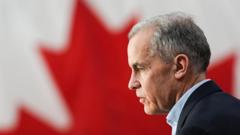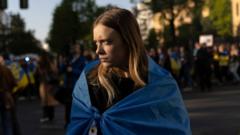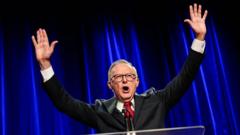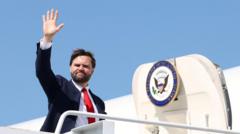Romania embarks on a crucial presidential election re-run today, six months after the previous vote was voided due to fraud allegations and opposition from the US. The race pits nationalist George Simion against multiple centrist candidates, with severe implications for the country’s geopolitical stance amidst ongoing assistance to Ukraine.
Romania's Repeat Presidential Election: A Nation's Quest for Leadership
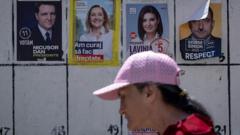
Romania's Repeat Presidential Election: A Nation's Quest for Leadership
Following a controversial annulment, Romania votes again for president with pivotal implications for the region and its foreign relations.
Romania is holding a significant presidential election rerun today, following a contentious first round that was annulled over allegations of campaign fraud and Russian interference in November. The radical Calin Georgescu, who had initially secured the most votes, was barred from participating in this second attempt. The current race sees nationalist George Simion, leader of the Alliance for the Union of Romanians (AUR), facing off against three central candidates: Bucharest's well-liked mayor Nicusor Dan, liberal Crin Antonescu from the ruling coalition, and independent Elena Lasconi. In total, seven candidates will appear on the ballot.
George Simion emphasized his campaign’s broader message, stating, "This election is not about one candidate or another, but about every Romanian who has been lied to, ignored, humiliated, and still has the strength to believe and defend our identity and rights." Polls, however unreliable, indicate Simion may lead today, potentially setting the stage for a competitive runoff against either Nicusor Dan or Crin Antonescu on May 18 if no candidate achieves over 50% of the vote.
International observers, particularly in Washington, Kyiv, and Moscow, are nervously awaiting the results given Romania's strategic role as a transit route for military supplies to Ukraine. Romania hosts critical NATO assets, including a US missile defense shield and airbases facilitating operations near Ukraine's borders. The evolving political landscape further complicates US relations with Romania, especially with the Trump administration reconsidering its support following the abrupt cancellation of a visa-waiver agreement right before the election.
Simion's campaign has sparked resentment over Romania's financial contribution to Ukrainian refugee support, though he denies pro-Russian sympathies. As Bucharest buzzes with activity around the presidential residence, Cotroceni Palace, citizens reflect on their voting intentions. Voices of change are echoed in the crowd, with many opting for Nicusor Dan in hopes of fresh leadership amid ongoing corruption issues.
The Romanian diaspora, with a million registered voters largely impotent in opinion polls, may play a decisive role in this election, as they have already begun casting their ballots from countries like Spain, Italy, Germany, and the UK. The atmosphere is charged as the country stands at a crossroads, deeply aware that the outcome will extend beyond Romania, influencing regional dynamics and national security policies in a time of conflict.

